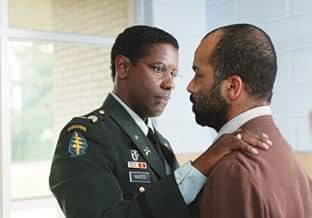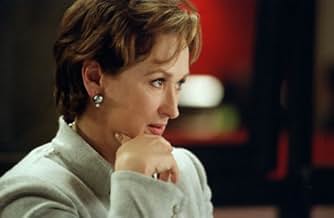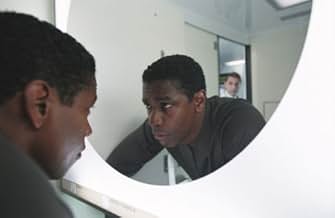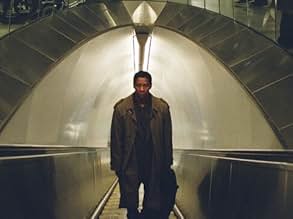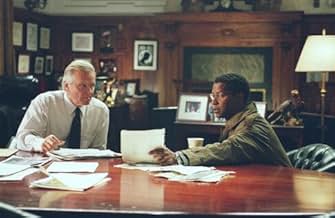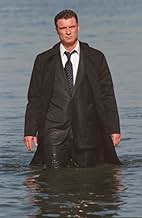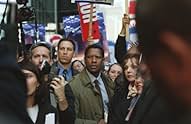No meio da Guerra do Golfo, os soldados são sequestrados e submetidos a uma lavagem cerebral para fins sinistros.No meio da Guerra do Golfo, os soldados são sequestrados e submetidos a uma lavagem cerebral para fins sinistros.No meio da Guerra do Golfo, os soldados são sequestrados e submetidos a uma lavagem cerebral para fins sinistros.
- Direção
- Roteiristas
- Artistas
- Indicado para 1 prêmio BAFTA
- 1 vitória e 12 indicações no total
Joe Alessi
- Boy Scout #2
- (as Joseph Alessi)
Raymond Anthony Thomas
- Scout Dad
- (as Ray Anthony Thomas)
Avaliações em destaque
The original version of this film was a very disturbing film due to the fact that it was at the height of the cold war and that it was during the time when America and the world faced its greatest crisis in the Cuban Missile Crisis and due to the fact that one short year after the original was released, President Kennedy was assassinated.
The main difference between this film and the original was that the original villains were the Communists and the villains in this film is big business. The Manchurian Corporation pretty much could be seen as stand-ins for not only Halleburton, but also could be seen as a stand in for many other corporate entities that pretty much want to wield influence in our government.
Another way this film works is as a strong psychological thriller. You pretty much have the troops brainwashed much as they were in the original, only it is more technologically based. However, the thing that really made this film as creepy as it was, was the relationship between Raymond and his mother. In the original, Raymond's mother was nothing more than a manipulative harpy who would stop at nothing to make sure she and her husband became the next president. However, in this version the film goes even farther by even implying that Mrs. Shaw (Mrs. Iselin in the original) almost has an incestuous obsession with her son. This is what really distinguishes this film from the original.
This definitely is one of top thrillers of the year.
The main difference between this film and the original was that the original villains were the Communists and the villains in this film is big business. The Manchurian Corporation pretty much could be seen as stand-ins for not only Halleburton, but also could be seen as a stand in for many other corporate entities that pretty much want to wield influence in our government.
Another way this film works is as a strong psychological thriller. You pretty much have the troops brainwashed much as they were in the original, only it is more technologically based. However, the thing that really made this film as creepy as it was, was the relationship between Raymond and his mother. In the original, Raymond's mother was nothing more than a manipulative harpy who would stop at nothing to make sure she and her husband became the next president. However, in this version the film goes even farther by even implying that Mrs. Shaw (Mrs. Iselin in the original) almost has an incestuous obsession with her son. This is what really distinguishes this film from the original.
This definitely is one of top thrillers of the year.
The 1962 version of "The Manchurian Candidate" - starring Frank Sinatra and Lawrence Harvey - caught the conspiratorial mood of the time when so many Americans saw a commie round every corner. The current 'war of terror' might have seemed like an apposite time to attempt a remake. I've been a fan of Denzel Washington since he played Steve Biko in "Cry, Freedom" and I regard Meryl Street as the finest actress of her generation, so the chance to see the two starring together for the first time was an attractive one. Since I'm a political animal, the vehicle of a political thriller appeared to add to the attraction. But Jonathan Demme's remake of John Frankenheimer's classic, although it has a certain style, is overall a real disappointment. Frankly it is lackluster when it is not simply silly.
Streep gives a bravado performance as the manipulative mother of the Vice-Presidential candidate who is under external control and Washington is always watchable, but Liev Schreiber as the brain-drilled war hero and politician is robotic even when he is not 'activated'. The 'up-dating' of the story to make corporations rather than Communists the enemy is a well-worn theme, ranging from the Peter Sellers' movie "Being There" to the more recent television series "24". What this new version of Richard Condon's 1959 novel tells us is that Americans are no less fearful and paranoid than they were in the Cold War and Hollywood is no better at remakes than it ever was.
Streep gives a bravado performance as the manipulative mother of the Vice-Presidential candidate who is under external control and Washington is always watchable, but Liev Schreiber as the brain-drilled war hero and politician is robotic even when he is not 'activated'. The 'up-dating' of the story to make corporations rather than Communists the enemy is a well-worn theme, ranging from the Peter Sellers' movie "Being There" to the more recent television series "24". What this new version of Richard Condon's 1959 novel tells us is that Americans are no less fearful and paranoid than they were in the Cold War and Hollywood is no better at remakes than it ever was.
While the 2004 remake of "The Manchurian Candidate" is ensemble acting at its finest, Meryl Streep seems to be having a bit too much fun playing the villainess Eleanor Prentiss Shaw. She doesn't have the same blood-curdling constitution as did Angela Lansbury.
"What was I supposed to do, call a MEETING?" she exclaims as her wimpy male colleagues in the shadowy Manchurian Global upbraid her for ordering someone killed without consulting them. Problem is, she was radiantly glowing when she uttered the line, which produced laughs in the NYC theatre I was in.
When she showers Liev Schreiber with overly affectionate kisses and hugs, one again suspects Meryl was having a bit too much fun on camera with someone she finds quite attractive -- don't we all? -- in real life.
On its own, the 2004 remake is fine cinema. But the problem with all remakes is the inevitable comparison with original. And sadly, as much as I like the 2004 version, my vote goes with Angie Lansbury and Laurence Harvey.
"What was I supposed to do, call a MEETING?" she exclaims as her wimpy male colleagues in the shadowy Manchurian Global upbraid her for ordering someone killed without consulting them. Problem is, she was radiantly glowing when she uttered the line, which produced laughs in the NYC theatre I was in.
When she showers Liev Schreiber with overly affectionate kisses and hugs, one again suspects Meryl was having a bit too much fun on camera with someone she finds quite attractive -- don't we all? -- in real life.
On its own, the 2004 remake is fine cinema. But the problem with all remakes is the inevitable comparison with original. And sadly, as much as I like the 2004 version, my vote goes with Angie Lansbury and Laurence Harvey.
In the midst of the Gulf War, soldiers are kidnapped and brainwashed for sinister purposes.
As with any remake, it is more or less impossible to live up to the original. Even here, with plenty of major stars, a bigger budget and an Oscar-winning director, it would be wrong to say this is better than the original. Maybe as good, though that is doubtful. Certainly not better.
Updating the plot from Korea to Iraq makes sense and is a wise move. I am not as thrilled about the science fiction aspects. My memory (though it may be faulty) recalls the original being mostly brainwashing and triggers. It does not recall any actual removal of brains and wildly futuristic surgery. This, to me, takes away from the film, and especially because it is revealed so early on (within ten minutes).
As with any remake, it is more or less impossible to live up to the original. Even here, with plenty of major stars, a bigger budget and an Oscar-winning director, it would be wrong to say this is better than the original. Maybe as good, though that is doubtful. Certainly not better.
Updating the plot from Korea to Iraq makes sense and is a wise move. I am not as thrilled about the science fiction aspects. My memory (though it may be faulty) recalls the original being mostly brainwashing and triggers. It does not recall any actual removal of brains and wildly futuristic surgery. This, to me, takes away from the film, and especially because it is revealed so early on (within ten minutes).
Here's something I never thought I'd say: I enjoyed parts of "The Manchurian Candidate" remake; it isn't as bad as I expected it to be.
And much of the credit goes to the three main players - Denzel Washington as the paranoid veteran, Liev Schreiber as the titular character and Meryl Streep as the power-hungry, Oedipally motivated Senator Eleanor Shaw.
Screenwriters Daniel Pyne and Dean Georgaris reinvent and contemporize Richard Condon's novel and the 1962 film. While John Frankenheimer's film, written by George Axelrod, was the apotheosis of the Cold War thriller and a scathing indictment of McCarthyism, Jonathan Demme's remake is less subtle in its approach and paranoia, but takes barbed jabs at current politics, the corruptibility of our elected leaders and paranoia disguised as patriotism in a post-9/11 America.
The remake also owes a debt of gratitude to Alan J. Pakula's brilliant 1974 paranoia-conspiracy thriller, "The Parallax View."
Although it isn't clear whether Raymond Shaw is a Republican or Democrat - his mother certainly seems more Republican in her outlook and politics - Demme and his writers' point is that all American politicians are bought and paid for by big business. As we all know, we never heeded President Eisenhower's prescient caution about the military industrial complex.
The villainous Manchurian Global clearly was inspired by Halliburton - there's even mention of the company getting no-bid contracts. Pay close attention and you'll hear pointed references about the use of private contractors by the military, malfunctioning touch-screen voting machines and our government's "compassionate vigilance." Also, look fast and you'll see a news crawl about a Wal-Mart-type chain and a newspaper story about our treatment of Muslims.
Washington's awfully convincing as a man fraying at the edges, whose grip on reality seems to be slowly slipping, and there were a few moments where Schreiber almost reminded me of Laurence Harvey.
Streep, on the other hand, proves why she is undoubtedly the best actress this nation has ever produced. Her Eleanor spits venom. We're utterly convinced why Raymond's such a cuckold. We can only imagine what his poor father must have endured. Streep occasionally comes close to being campy, but so completely dominates the screen that she scares us even when she chews ice.
But several other talented actors, including Jon Voight, Vera Farmiga, Dean Stockwell and Ted Levine, are used to little or no effect.
Some crucial plot elements make no sense. The Dr. Noyle scenario, for instance, proves to be illogical, especially when we learn more about him. Neither Pyne nor Georgaris attempted to rectify this deficiency. Also, the mysterious Muslim women are superfluous. I wonder if their bit wound up on the cutting-room floor.
The film contains an unmistakable cynical tone. As much as it's clearly an indictment of big business' control of politics, it also denounces our leaders' insistence on keeping the public on edge with terror alerts. And as Senator Shaw points out, "The assassin always dies. It's necessary for the national healing."
But after maintaining its cynicism for much of the film, it comes apart completely at the end. Demme and his writers cop out with a pointless and weak denouement. That gunshot you hear is Demme shooting himself in the foot.
It's almost as if they gave in to appease some mindless preview audience or dimwitted studio hack. Or, maybe they envisioned it just like this. Given my admiration of Demme, I'd like to think otherwise. Hope I'm right.
And much of the credit goes to the three main players - Denzel Washington as the paranoid veteran, Liev Schreiber as the titular character and Meryl Streep as the power-hungry, Oedipally motivated Senator Eleanor Shaw.
Screenwriters Daniel Pyne and Dean Georgaris reinvent and contemporize Richard Condon's novel and the 1962 film. While John Frankenheimer's film, written by George Axelrod, was the apotheosis of the Cold War thriller and a scathing indictment of McCarthyism, Jonathan Demme's remake is less subtle in its approach and paranoia, but takes barbed jabs at current politics, the corruptibility of our elected leaders and paranoia disguised as patriotism in a post-9/11 America.
The remake also owes a debt of gratitude to Alan J. Pakula's brilliant 1974 paranoia-conspiracy thriller, "The Parallax View."
Although it isn't clear whether Raymond Shaw is a Republican or Democrat - his mother certainly seems more Republican in her outlook and politics - Demme and his writers' point is that all American politicians are bought and paid for by big business. As we all know, we never heeded President Eisenhower's prescient caution about the military industrial complex.
The villainous Manchurian Global clearly was inspired by Halliburton - there's even mention of the company getting no-bid contracts. Pay close attention and you'll hear pointed references about the use of private contractors by the military, malfunctioning touch-screen voting machines and our government's "compassionate vigilance." Also, look fast and you'll see a news crawl about a Wal-Mart-type chain and a newspaper story about our treatment of Muslims.
Washington's awfully convincing as a man fraying at the edges, whose grip on reality seems to be slowly slipping, and there were a few moments where Schreiber almost reminded me of Laurence Harvey.
Streep, on the other hand, proves why she is undoubtedly the best actress this nation has ever produced. Her Eleanor spits venom. We're utterly convinced why Raymond's such a cuckold. We can only imagine what his poor father must have endured. Streep occasionally comes close to being campy, but so completely dominates the screen that she scares us even when she chews ice.
But several other talented actors, including Jon Voight, Vera Farmiga, Dean Stockwell and Ted Levine, are used to little or no effect.
Some crucial plot elements make no sense. The Dr. Noyle scenario, for instance, proves to be illogical, especially when we learn more about him. Neither Pyne nor Georgaris attempted to rectify this deficiency. Also, the mysterious Muslim women are superfluous. I wonder if their bit wound up on the cutting-room floor.
The film contains an unmistakable cynical tone. As much as it's clearly an indictment of big business' control of politics, it also denounces our leaders' insistence on keeping the public on edge with terror alerts. And as Senator Shaw points out, "The assassin always dies. It's necessary for the national healing."
But after maintaining its cynicism for much of the film, it comes apart completely at the end. Demme and his writers cop out with a pointless and weak denouement. That gunshot you hear is Demme shooting himself in the foot.
It's almost as if they gave in to appease some mindless preview audience or dimwitted studio hack. Or, maybe they envisioned it just like this. Given my admiration of Demme, I'd like to think otherwise. Hope I'm right.
Você sabia?
- CuriosidadesTina Sinatra, who was instrumental in deciding to remake the film, inherited the production rights from her father, Frank Sinatra, who played Bennett Marco in the 1962 version.
- Erros de gravaçãoMen and women in military uniforms are shown on stage at the convention. It is against the law for military personnel in uniform to participate in partisan political activity.
- Citações
Eleanor Shaw: The assassin always dies, baby. It's necessary for the national healing.
- ConexõesFeatured in Jonathan Demme and the Making of 'The Manchurian Candidate' (2004)
- Trilhas sonorasFortunate Son
Written by John Fogerty (as John C. Fogerty)
Performed & Produced by Wyclef Jean
Wyclef Jean performs courtesy of J Records
Principais escolhas
Faça login para avaliar e ver a lista de recomendações personalizadas
- How long is The Manchurian Candidate?Fornecido pela Alexa
Detalhes
- Data de lançamento
- País de origem
- Idioma
- Também conhecido como
- El Embajador Del Miedo
- Locações de filme
- Empresas de produção
- Consulte mais créditos da empresa na IMDbPro
Bilheteria
- Orçamento
- US$ 80.000.000 (estimativa)
- Faturamento bruto nos EUA e Canadá
- US$ 65.955.630
- Fim de semana de estreia nos EUA e Canadá
- US$ 20.018.620
- 1 de ago. de 2004
- Faturamento bruto mundial
- US$ 96.105.910
- Tempo de duração2 horas 9 minutos
- Cor
- Mixagem de som
- Proporção
- 1.85 : 1
Contribua para esta página
Sugerir uma alteração ou adicionar conteúdo ausente

Principal brecha
What was the official certification given to Sob o Domínio do Mal (2004) in Mexico?
Responda



